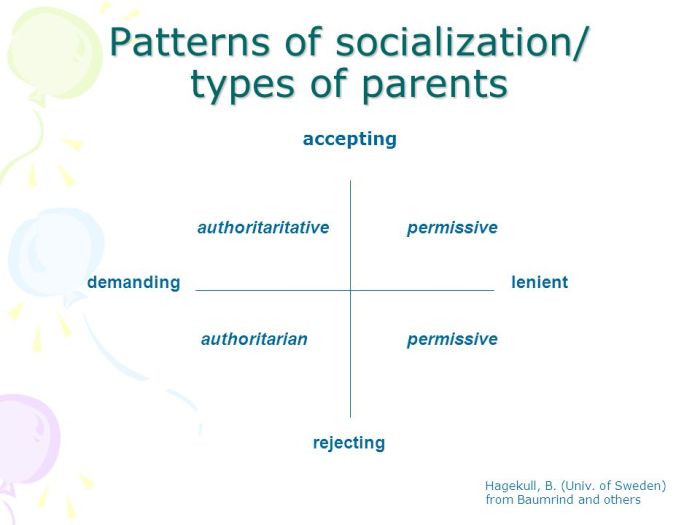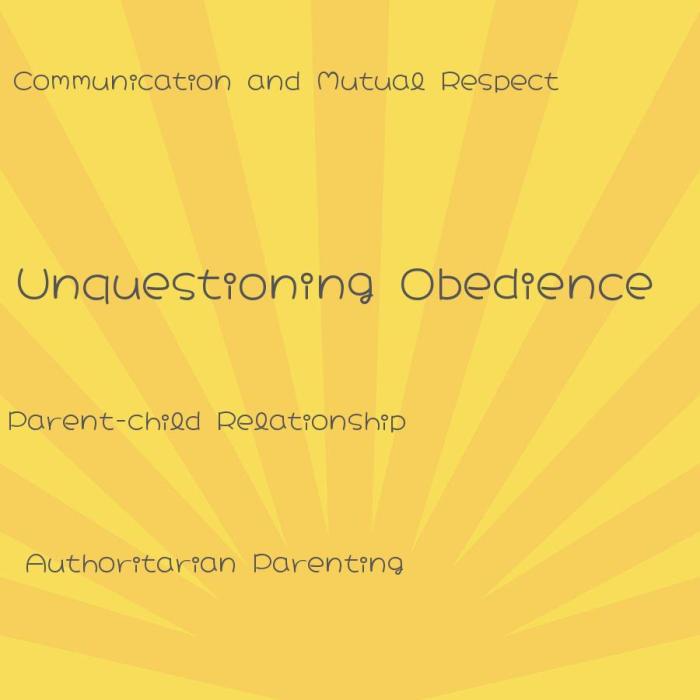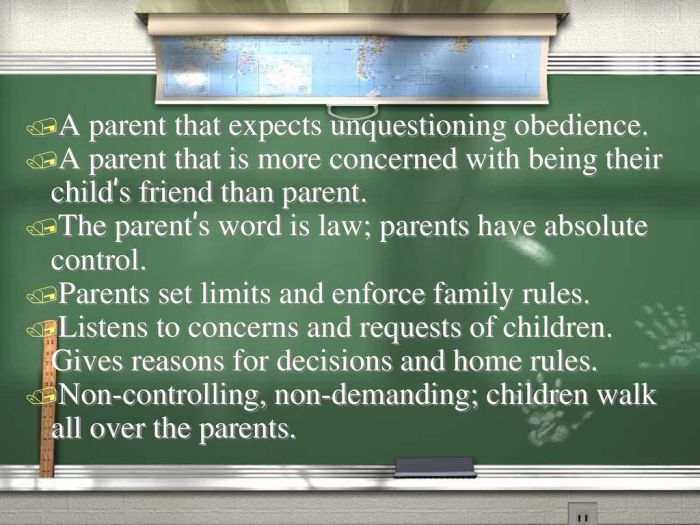When parents expect unquestioning obedience, they demand complete compliance from their children without any room for questioning or discussion. This parenting approach, often rooted in cultural and societal norms, can have profound psychological effects on children’s development and overall well-being.
In this comprehensive exploration, we delve into the concept of unquestioning obedience in parenting, examining its potential consequences and the alternative approaches that emphasize respect, autonomy, and open communication.
1. Defining Unquestioning Obedience

Unquestioning obedience in parenting refers to the expectation that children will comply with their parents’ commands without question or hesitation. It manifests as a rigid adherence to parental authority, where children suppress their own thoughts, feelings, and opinions to meet their parents’ expectations.
This obedience can extend to all aspects of a child’s life, from daily routines to major decisions.
Examples of Unquestioning Obedience, When parents expect unquestioning obedience
- Children obeying their parents’ orders without asking for explanations or expressing their own views.
- Children refraining from questioning parental decisions, even when they disagree or find them unreasonable.
- Children conforming to parental expectations without considering their own preferences or aspirations.
Potential Consequences of Unquestioning Obedience
- Inhibited critical thinking:Children may develop a habit of suppressing their own thoughts and opinions, leading to a lack of independent judgment and decision-making skills.
- Low self-esteem:Constant obedience can erode children’s sense of self-worth and autonomy, making them feel inferior or incapable.
- Difficulty forming healthy relationships:Children who have not learned to question authority may struggle to establish healthy relationships where they can express their own opinions and assert their boundaries.
2. Psychological Impact of Unquestioning Obedience

Unquestioning obedience can have profound psychological effects on children’s development.
Impact on Self-Esteem
Children who are expected to obey without question may develop a negative self-image. They may feel inadequate or unworthy because their own thoughts and feelings are not valued or respected. This can lead to low self-esteem and a lack of confidence in their own abilities.
Impact on Autonomy
Unquestioning obedience can stifle children’s autonomy. They may become overly dependent on their parents for guidance and direction, and may have difficulty making decisions on their own. This can hinder their development of independence and self-reliance.
Impact on Critical Thinking Skills
Children who are not allowed to question or challenge their parents’ authority may develop a habit of accepting things at face value. They may not learn to think critically or to evaluate information objectively. This can make them more susceptible to manipulation and influence.
3. Cultural and Societal Influences: When Parents Expect Unquestioning Obedience
Cultural and societal norms play a significant role in shaping expectations of unquestioning obedience.
Cultural Perspectives on Parenting and Obedience
In some cultures, obedience is highly valued and seen as a sign of respect for authority. Children are expected to obey their parents without question, and any form of disobedience is met with disapproval or punishment. In other cultures, parents may place more emphasis on fostering children’s independence and critical thinking skills.
Social Pressures and Societal Expectations
Social pressures and societal expectations can also influence parents’ beliefs about obedience. Parents may feel pressure to conform to societal norms and to raise their children in a way that is acceptable to others. This can lead to them expecting unquestioning obedience from their children, even if it goes against their own personal values.
4. Alternative Parenting Approaches
There are alternative parenting approaches that emphasize respect, autonomy, and open communication.
Fostering Critical Thinking and Independent Decision-Making
Parents can encourage their children to develop critical thinking and independent decision-making skills by allowing them to ask questions, express their opinions, and make their own choices. This helps children to develop a sense of self-confidence and to learn how to make responsible decisions.
Challenges and Drawbacks of Alternative Parenting Approaches
Alternative parenting approaches can be challenging, especially for parents who have been raised with more traditional values. It can be difficult to let go of the desire for control and to allow children to make their own mistakes. However, the benefits of alternative parenting approaches far outweigh the challenges.
5. Effective Communication and Conflict Resolution

Effective communication is essential in parent-child relationships.
Importance of Open Dialogue
Parents need to be open to talking to their children about anything, even difficult topics. They need to create an environment where children feel safe to express their thoughts and feelings without fear of judgment or punishment.
Strategies for Respectful Communication
There are several strategies that parents can use to engage in respectful and open dialogue with their children. These include:
- Active listening: Parents should listen to their children attentively and try to understand their perspective.
- Validation: Parents should validate their children’s feelings, even if they don’t agree with them.
- I-statements: Parents should use “I-statements” to express their own feelings and needs without blaming their children.
Conflict Resolution Techniques
Conflict is a normal part of parent-child relationships. However, it is important to resolve conflicts in a way that promotes understanding and compromise. Some effective conflict resolution techniques include:
- Mediation: A third party can help to facilitate a discussion between parents and children and to find a solution that is acceptable to both parties.
- Negotiation: Parents and children can negotiate to find a compromise that meets the needs of both parties.
- Problem-solving: Parents and children can work together to identify the problem and to find a solution that addresses the root cause.
Frequently Asked Questions
What is the definition of unquestioning obedience in parenting?
Unquestioning obedience in parenting refers to the expectation that children comply with their parents’ demands without any hesitation or questioning.
What are the potential consequences of expecting unquestioning obedience from children?
Unquestioning obedience can stifle children’s self-esteem, autonomy, and critical thinking skills, potentially leading to long-term difficulties in relationships and overall well-being.
What are some alternative parenting approaches that emphasize respect and autonomy?
Alternative parenting approaches include authoritative parenting, which balances parental authority with respect for children’s independence, and democratic parenting, which involves children in decision-making.